2019年外研版初中英语九年级上册Module 1 Unit 3 Language in use学案
外研版-英语-九年级上册-外研版九上英语:Module1 3单元 参考课件
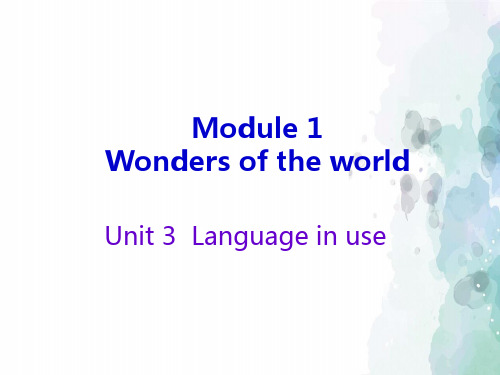
Unit 3 Language in use
语法聚焦
英语六大基本时态
1.一般现在时
定义
(常涉及现在):表示现在经常反复发生 的或习惯性的动作或状态;还可用来描述 真理
谓语构成 am/is/are,do/does
时间状语
always, usually, often, sometimes, seldom, hardly, never,every year, once a day,twice a week,three times a month,on Sundays等
课堂练习
一、用所给单词的适当形式填空 1. Her uncle ____h_a_s__t_a_u_g_h_t___ (teach) in this school since 2002. 2. His mother ___g_o_t____ (get) up at six o’clock and made breakfast for him. 3. Look ! Mike ____i_s__f_l_y_i_n_g____ (fly) kites with David. 4. My father isn ’t at home. He ___h_a_s__g_o_n_e___ (go) to work. 5. Betty will go shopping with me if it __d_o_e_s_n_’__t__r_a_i_n__ (not rain) tomorrow.
4.过去进行时
定义
定义(常涉及过去某一时刻):表示过去 某个时间点或过去某时间段正在进行的 动作
谓语构成 was/were doing
2019年外研版九年级上册英语教案:Module1Unit3Languageinuse

-教师应设计一些情景模拟活动,让学生在具体的情境中练习使用一般将来时,如模拟面试、未来规划演讲等,以提高学生的实际应用能力。
注意:以上教学难点与重点紧密结合教材内容,旨在帮助学生透彻理解核心知识,并针对学生的具体难点提供有效的教学指导。
四、教学流程
(一)导入新课(用时5分钟)
同学们,今天我们将要学习的是《Module 1 Unit 3 Language in use》这一章节。在开始之前,我想先问大家一个问题:“你们有没有想过自己的未来会是怎样的?”这个问题与我们将要学习的内容密切相关。通过这个问题,我希望能够引起大家的兴趣和好奇心,让我们一同探索如何用英语谈论未来的奥秘。
(二)新课讲授(用时10分钟)
1.理论介绍:首先,我们要了解一般将来时的基本概念。一般将来时是用来描述未来发生的事情或打算、计划做的事情。它在我们的日常交流中非常重要,帮助我们表达对未来的期待和规划。
2.案例分析:接下来,我们来看一个具体的案例。这个案例展示了如何运用一般将来时来谈论个人的未来计划,以及它如何帮助我们清晰地表达这些计划。
3.重点难点解析:在讲授过程中,我会特别强调一般将来时的句子结构和用法,如“will +动词原形”,以及如何构造疑问句和否定句。对于难点部分,我会通过举例和比较来帮助大家理解。
(三)实践活动(用时10分钟)
1.分组讨论:学生们将分成若干小组,每组讨论一个与未来计划相关的实际问题。
外研版-英语-九上Module1:3单元教案
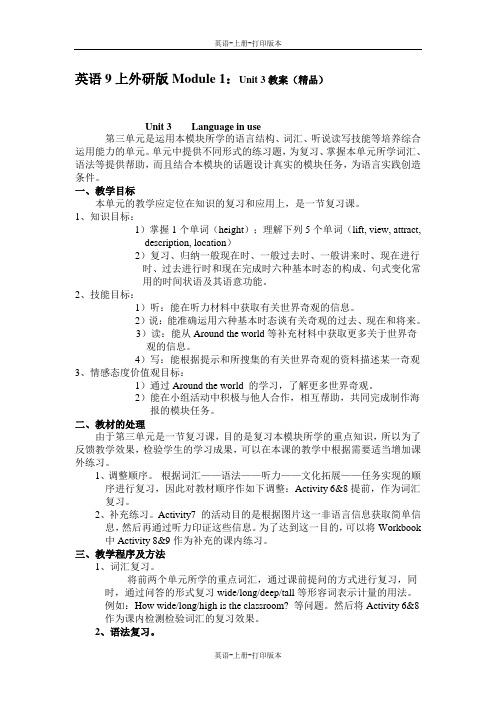
英语9上外研版Module 1:Unit 3教案(精品)Unit 3 Language in use第三单元是运用本模块所学的语言结构、词汇、听说读写技能等培养综合运用能力的单元。
单元中提供不同形式的练习题,为复习、掌握本单元所学词汇、语法等提供帮助,而且结合本模块的话题设计真实的模块任务,为语言实践创造条件。
一、教学目标本单元的教学应定位在知识的复习和应用上,是一节复习课。
1、知识目标:1)掌握1个单词(height);理解下列5个单词(lift, view, attract,description, location)2)复习、归纳一般现在时、一般过去时、一般讲来时、现在进行时、过去进行时和现在完成时六种基本时态的构成、句式变化常用的时间状语及其语意功能。
2、技能目标:1)听:能在听力材料中获取有关世界奇观的信息。
2)说:能准确运用六种基本时态谈有关奇观的过去、现在和将来。
3)读:能从Around the world等补充材料中获取更多关于世界奇观的信息。
4)写:能根据提示和所搜集的有关世界奇观的资料描述某一奇观3、情感态度价值观目标:1)通过Around the world 的学习,了解更多世界奇观。
2)能在小组活动中积极与他人合作,相互帮助,共同完成制作海报的模块任务。
二、教材的处理由于第三单元是一节复习课,目的是复习本模块所学的重点知识,所以为了反馈教学效果,检验学生的学习成果,可以在本课的教学中根据需要适当增加课外练习。
1、调整顺序。
根据词汇——语法——听力——文化拓展——任务实现的顺序进行复习,因此对教材顺序作如下调整:Activity 6&8提前,作为词汇复习。
2、补充练习。
Activity7 的活动目的是根据图片这一非语言信息获取简单信息,然后再通过听力印证这些信息。
为了达到这一目的,可以将Workbook 中Activity 8&9作为补充的课内练习。
三、教学程序及方法1、词汇复习。
初中英语外研版九年级上册《Moudle1第一课时 Unit3 Language in use 》课件

morning. 表示在具体的过去某个时刻,正在产生的动作或状态
4. a) He is doing an interview. 表示正在进行采访
b) He has done an interview. 表示已经做了采访
表示说话时正在进行的动作
5. a) We are drawing a picture of the Victoria Falls now.
外研(新标准)版-九年级上册
Explain the differences in meaning.
1. a) I often play basketball. 表示常常性、习惯性的动作。
b) I am playing basketball now. 表示说话时正在进行的动作或行为。
2. a) She has gone to the Great Wall. 表示去了长城,现在还没回来;不在说话现场。
The XXX was going down when we (1)a_r_r_iv_e_d__(arrive) at
the ground floor of the building. I (w2a)_s_____(be) afraid of going to the top of tall buildings, so I was a little nervous when
Grand Canyon when the teacher came into the classroom.
上21世纪教育网 下精品教学资源
外研(新标准)版-九年级上册
Complete the passage with the correct form of the words in brackets.
2019秋外研版九年级英语上册Module 1 Wonders of the world Unit
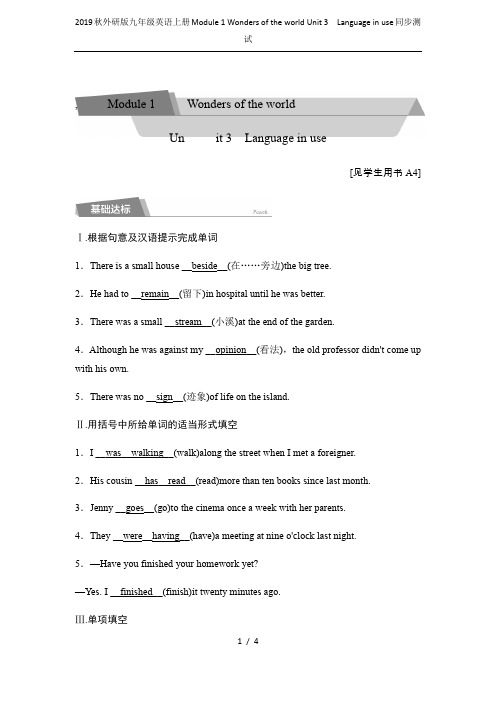
,Module 1Wonders of the worldUn it 3Language in use[见学生用书A4]Ⅰ.根据句意及汉语提示完成单词1.There is a small house __beside__(在……旁边)the big tree.2.He had to __remain__(留下)in hospital until he was better.3.There was a small __stream__(小溪)at the end of the garden.4.Although he was against my __opinion__(看法),the old professor didn't come up with his own.5.There was no __sign__(迹象)of life on the island.Ⅱ.用括号中所给单词的适当形式填空1.I __was__walking__(walk)along the street when I met a foreigner.2.His cousin __has__read__(read)more than ten books since last month.3.Jenny __goes__(go)to the cinema once a week with her parents.4.They __were__having__(have)a meeting at nine o'clock last night.5.—Have you finished your homework yet?—Yes. I __finished__(finish)it twenty minutes ago.Ⅲ.单项填空(B)1.I have to be off now.My friends ________ outside.A.wait B.are waitingC.have waited D.were waiting(C)2.Miss Lin________ a lot of work for the poor area since 2010.A.does B.didC.has done D.will do(C)3.We have no more vegetables in the fridge.I ________ and buy some. A.am going B.wentC.will go D.was going(C)4.—Millie, where is Miss Li?—She ________ a speech on Chinese art to the first-year students in the hall. A.gives B.gaveC.is giving D.has given(D)5.—How long have you had your new bike?—For ________ a month.A.hardly B.clearlyC.greatly D.nearly(B)6.He didn't ________ my question.Instead,he asked me to ________ to his letter right now.A.answer;replying B.answer;replyC.reply;answering D.reply;answer(B)7.—What do the students like to do after school?—You know one of the most popular activities ________ reading poems.A.are B.isC.was D.were(B)8.They don't live here any longer.They ________ to Chengdu last month. A.move B.movedC.will move D.are movingⅣ.词汇运用根据短文内容和括号内所给汉语意思,写出空白处各单词的正确形式(每空一词)。
Module1Unit3外研版英语九年级上册单元教案

1.教学重点
-语言知识:本节课的核心词汇(language, grammar, pronounce, dialect, worldwide, aspect等)和句型(I learned... I spoke... I could...)的掌握和应用。
-语法结构:一般过去时的正确使用,以及如何运用该时态描述过去的语言学习经历。
-语法难点:学生可能对一般过去时的构成(动词过去式)和用法不够熟悉,需要通过例句、表格和练习来强化记忆。
-阅读难点:在阅读理解练习中,学生可能难以识别文章的主旨句和作者的态度,教师需要指导学生通过关键词、连接词和语境线索来提升这方面的能力。
四、教学流程
(一)导入新课(用时5分钟)
同学们,今天我们将要学习的是Module 1 Unit 3 “Languages”。在开始之前,我想先问大家一个问题:“你们在学习英语的过程中,有没有对其他语言产生过兴趣?”这个问题与我们将要学习的内容密切相关。通过这个问题,我希望能够引起大家的兴趣和好奇心,让我们一同探索不同语言的奥秘。
(二)新课讲授(用时10分钟)
1.理论介绍:首先,我们要了解世界不同语言的基本概念。语言是人类交流的工具,每种语言都有其独特的语法和发音特点。了解不同语言的分布和特点有助于我们更好地理解世界文化的多样性。
2.案例分析:接下来,我们来看一个具体的案例。这个案例将展示英语作为国际语言的地位以及它在跨文化交流中的作用。
4.掌握单词:language, grammar, pronounce, dialect, worldwide, aspect等;
5.熟练运用以下句型:I learned... I spoke... I could...;
6.阅读理解:理解关于英语作为国际语言的短文,并提取关键信息。
外研版英语九年级上册-Module 1 Unit 3 Language in use 课件
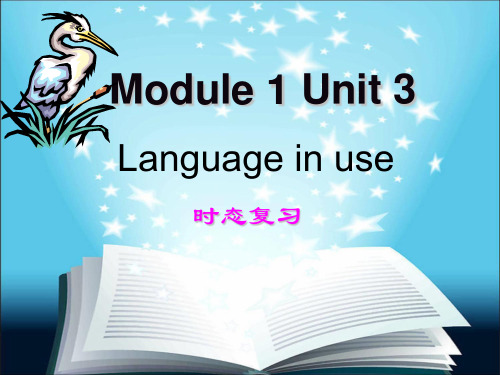
一般疑问构成:
• Have/Has+主语+过去分词?
• 特殊疑问句举例:
What have you done recently? How long has he lived in Beijing?
• 备注:暂时性动词不能与for…, since…,How long…等表示段时间的短语同时使用。
Module 1 Unit 3
Language in use
时态复习
一般现在时、一般过去时 现在进行时、过去进行时 现在完成时、一般将来时
一、一般现在时
• 用法:经常性的和习惯性的动作 • 常用时间状语:usually, sometimes, in
spring, every day, in the morning • 动词构成 :动词原型 work 动词+S.(主语是第三人称单数)works • 否定构成 : don’t + 动原
• I have borrowed the book for three days. (错)
• I borrowed the book three days ago.
六、一般将来时
• 用法:将来会出现或发生的动作。 • 常用时间状语:this evening, tomorrow,
next month, in a few minutes, at the end of this term. • 动词构成: 1 will/shall+动原 2 am/is/are going to+动词原型 3 am/is/are(about)+动词不定式 4 am/is/are+coming等现在分词 • 否定构成:will/shall not do …
外研版 九年级 上学期 Module 1 Unit 3

一般现在时 (do/does)
1) 经常性或习惯性动作
2) 现在存在的特征、能力或状态
3) 普遍真理、客观事实等
e.g. Maria does exercise every day.
玛利亚每天都锻炼。
注意:
1. when, until, as soon as等引导的时间状 语从句和 if 引导的条件状语从句中, 若主句是将来时或祈使句, 从句则要用 一般现在时表示将来。 2. 列车时刻,飞机航班用一般现在时。
2. a) She’s gone to the Great Wall.
b) She’s been to the Great Wall twice.
a) She is still at the Great Wall.
b) She has come back from the Great
Wall.
3. a) They had an English class yesterday. b) They were having an English class at nine o’clock yesterday morning. a) They did it once in the past. b) They were doing something at a specific time.
No 88. The Jin Mao Building in Shanghai
(7) __ is (be) 420.5 meters high, one of the tallest buildings in the world. It was built in 1998 and it (8) ___ has (have) a fantastic view of Pudong District and the centre of Shanghai.
外研版九年级上册module1 unit3

( )8.What are you listening_____? (A)/ (B)for (C)at (D)to
( )10.They are_____their clothes.(A)makeing (B)putting (C)put away (D)putting on
A. are, many B. are , much C. is ,many D. is ,much
( )2.How many ___ are there in the room ? A. apple B. students C. milk D. paper
( )3.Do you know if ___ a meeting next Sunday ?
①延续性动词:表示的动作是能延续的动作,这种动作可以延续下去或产生持久的影响。
e.g.:learn\ work\ stand\ lie\ know\ walk\ keep\ have\ wait\ watch\ sing\ read\ sleep\ live
②终止性动词:也叫非延续性动词,瞬间动词,一次性动词。表示的动作不能延续,即动作发
teach——_______——_______ buy——_______——_______ bring——_______——_______ think ——_______——_______ sit ——_______——_______ write ——_______——_______
drive——_______——_______ ring——_______——_______ sink——_______——_______
外研版-英语-九上-Module1 3单元 教案

5.Ask thestudentsto complete the sentences and the passage in Parts 5-6 and check answers.
6.Listening:
a. Ask them to listen and number the pictures in Part 7
b.Ask them to listen again and complete the table in Part 8.
7.Work in pairs to talk about three other wonders.
口语能力
自主合作,提高创新能力。
课后巩固
补充材料
课堂小结
时态
板书
1. Unit 3 Language in use.
2. Tenses.
3. Posters.
8.Around the world
9.Module task: Making a poster about a wonder of the world. and present it in class.
10.Homework:
a.Make a poster about a wonder of the world.
b.Preview Module 2.
c.More exercises about tenses.
Read and say.
Observation
Complete.
英语9上外研版Module1Unit3优质教案(精品)
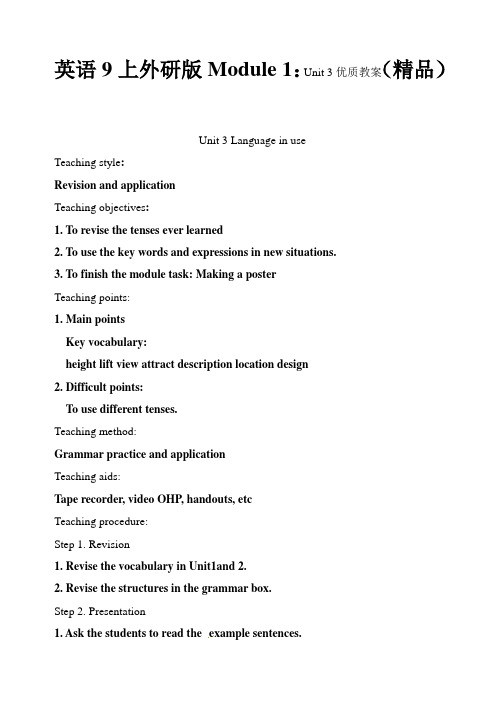
英语9上外研版Module 1:Unit 3优质教案(精品)Unit 3 Language in useTeaching style:Revision and applicationTeaching objectives:1. To revise the tenses ever learned2. To use the key words and expressions in new situations.3. To finish the module task: Making a posterTeaching points:1. Main pointsKey vocabulary:height lift view attract description location design2. Difficult points:To use different tenses.Teaching method:Grammar practice and applicationTeaching aids:Tape recorder, video OHP, handouts, etcTeaching procedure:Step 1. Revision1. Revise the vocabulary in Unit1and2.2. Revise the structures in the grammar box.Step 2. Presentation1. Ask the students to read the example sentences.2. Ask them to explain what they illustrate.Step 3. Work in groups1. Ask the students to work in groups of four and talk about the differences in meaning between sentences a and b, then call back the ans wers.2. Make the students match the three parts of the sentenc es in Activity 2.3. Call back the answers from the whole class as complete sentenc es.Step 4. Complete the passage1.Read through the words in the box with the class, having them repeatchorally and individually.2.Ask them to complete the activity individually, then check with a partner3.Call back the answers from the whole class as complete sentences.Step 5. Work in pairs1.Read the example with the whole class so they understand what to do.2.Ask them to work in pairs to interview their partners.3.Circulate and monitor their production.4.Call back some examples from the pairs.5.Look at the photos and notes in Activity7, guess where the notes go in thetable, then call back the answers.Step 6. Module task1. Ask the students to work in groups of four and plan a poster about a wonder of the world.2. Ask the groups to write their results of, then share with the whole class.Step 7. Practice一. 首字母填空1. The tree grew to a h______ of 20 feet.2. He uses a l______ to go up and down every day.3. The scenery of the city has a______ many tourists.4. He gave a d_______ of what he had seen.5. He d_______ a beautiful garden for our school.6. She’s g______ to the Great Wall.7. She’s b_______ to the Great Wall twice.8. The Great Wall is about 6,700 kilometers l_____.9. The Jin Mao building in Shanghai is 420.5 meters high.10. I h______ to go to shanghai again next year.二. 单项填空1. Mike did something wrong, ____ the headmaster is talkingwith him.A. soB. butC. andD. or2. Jim has been in the factory for two years _____ left school.A. whenB. sinceC. as soon asD. whether3. I must finish the work ____ I go home.A. beforeB. when C until D. if4. I won’t believe you ____ I see it with my own eyes.A. ifB. whenC. untilD. while5. –You’d better remember what I said yesterday, ____ others will laugh at you. -Sure. I’ll do it ____ you told me.A. or; asB. and; asC. or; afterD. and; after三.动词填空Once a Frenchman __1__ (get) to England. He __2__ (know) only a little English. One day when he was sitting by the window of a restaurant and __3__ (have) lunch, he heard a voice, “__4___ (look) out!” So he __5__ (put) his headout of the window __6__ (find) out what was happening out side. Just then a basin of dirty water poured over his head. He _7_ (be) very angry. He shouted, “Damn you! See what you __8__ (do)”People around _9_ (laugh) at him and he got even angrier. One of them said to him, “you must be a foreigner. ‘Look out’ in English__10__ (mean) ‘be careful’”.四. 书面表达我国有许多名胜古迹,每年都有许多人旅游,请结合你的实际情况,以A visit to ... 为题,写一篇短文,内容包括所乘交通工具以及路上所见所闻。
初中英语外研版九年级上册《Moudle1第二课时 Unit3 Language in use 》课件

Module 1 Wonders of the world
Unit 3 Language in use (2)
教学课件
外研(新标准)版-九年级上册
Look at these sentences.
眺望
(某物上面)看过 去在底部 俯视 一条银色的小河 够到顶部 峡谷的另外一边 向左看 延伸 据某人看来
上21世纪教育网 下精品教学资源
外研(新标准)版-九年级上册
the Changjiang River The Changjiang River is very long.
上21世纪教育网 下精品教学资源
外研(新标准)版-九年级上册
the Terracotta Army The Terracotta Army is a famous wonder in China.
上21世纪教育网 下精品教学资源
外研(新标准)版-九年级上册
Mount Qomolangma Mount Qomolangma is very high.
上21世纪教育网 下精品教学资源
外研(新标准)版-九年级上册
the Great Wall
The Great Wall is very old and very long.
C. sounds
D. feels
2. ——When is the school art festival? ——It will be held on time if it _____ next Monday.【202X年四川南 充】
A.don't rain B.won't rain C.doesn't rain D.didn't rain
外研版九年级英语上册 Module 1 Unit 3 Language in use课件
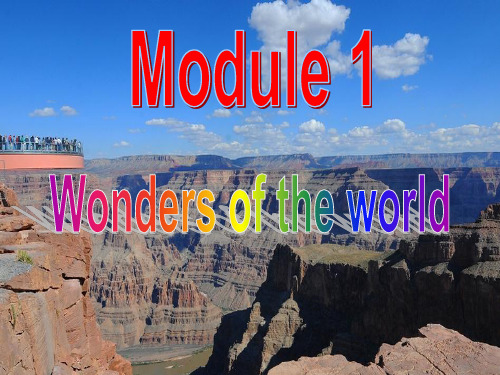
A. gives
B. gave
C. is giving
D. has given
8. — Have you had your breakfast yet? —Yes. Mom ____ it for me. A. was cooking B. is cooking C. will cook D. cooked
Summary:
Complete the sentences with the correct form of the words in the box.
1. Listen! It _i_s_r_a_in_i_n_g_ (rain) outside. 2. The great musician _w_i_l_l _g_iv_e___
many times because it is such a
beautiful city.
A. have been to B. has been to
C. has gone to D. have gone to
6. Sally took a photo of her friends while
they ____ computer games.
the Great Pyramid
Mount Qomolangma
the Empire State Building
Listen and complete the table.
Locatio n
Mount The
The
Qomolan Empire Great
gma
State
Pyramid
Building at Giza
1. the sun, rise, already The sun has already risen.
外研版九年级上册教案Module 1 Unit 3 Language in use

I met him last month.She looked well when I last saw her.
Did you see my watch this morning?
B、since从句常用过去时You haven’t changed muchsince
教学课题:Module 1
Unit 3 Language in use
项目
设计内容
备注
课时
第1课时
课型
复习课
教具
PPT
教学目标
知识目标
复习检查本模块单词与词组掌握情况
复习初中内容的8种时态
能力目标
能够灵活应用时态
情感目标
热爱祖国热爱家乡的美丽的风景
重点
时态
难点
时态
计意图
4.现在进行时:表示说话时或现阶段内正在进行的动作或存在的状态。
A.说话时动作正在进行着。What are you doing here?
I am writing a letter.
5.现在完成时:have /has +P.P(过去分词done)
A.表示动作已发生,这个动作的结果对现在仍有影响常与already, yet, now, just, by this time等时间状语连用。
课后反思
二、时态的用法:
1.一般现在时:表现在或经常性的动作、状态。
A.表现阶段或经常性的动作、状态。
他每天骑自行车上学。He goes to school by bike every day.
B.表客观真理
地球绕着太阳转。The earth goes round the sun。
2019教育外研版英语九上 Module 1 Unit 3 Language in use (共38张PPT)精品英语

主要用法
四、一般过去时 表达特定的过去时间内发生的动作
或存在的状况,或过去某一时间内经 常发生或反复发生的动作或行为。 例如:I washed my own clothes yesterday.
主要用法
五、过去进行时 1.表示过去某一时刻或某一段时间
例如:She is leaving for Beijing.
主要用法
三、现在完成时 1.表示过去发生的动作对现在产生
的影响或结果,或说话时已完成的动 作。
例如:I have finished the report. 2.表示从过去开始,待续到现在的动 作或状态,往往和“for…”, “since…” 表述的一段时间状语连用。
现在完成时 现在进行时
for a long time,recently,yet,lately,ever,never,already, ever since,by this time,before,just,in the past/last few years/时间段,since+过去的时间点,since+时间段+ago,since+ 从句(一般过去时),for+时间段,over the years, 次数(once) ,so far, all day, all these years, up to now等
主要用法
六、一般将来时 一般将来时表示将来要发生的动作
和存在的状况。 例如:The sun will set at 7:30 this
afternoon.
Can you tell me the structure of the tense?
一般现在时 现在进行时 现在完成时 一般过去时 过去进行时 一般将来时
- 1、下载文档前请自行甄别文档内容的完整性,平台不提供额外的编辑、内容补充、找答案等附加服务。
- 2、"仅部分预览"的文档,不可在线预览部分如存在完整性等问题,可反馈申请退款(可完整预览的文档不适用该条件!)。
- 3、如文档侵犯您的权益,请联系客服反馈,我们会尽快为您处理(人工客服工作时间:9:00-18:30)。
Module 1 Unit 3 Language in useStudying aims:1.Master all the new words and phrases2.Master all the new sentences预习自测一、根据句意和所给汉语提示完成句子1.He lied about his age to join the_________(军队)。
2.Don’t leave the light on,it tastes__________(电)3.The sun______(照耀)brightly in a cloudless sky.4.It’s only_______(自然的)that you should be nervous.5.He had $20,but that was not _______(几乎)enough for the trip.二、用方框内单词的适当形式填空1.If you don’t want to stay with us, please __________ here.2.There is a village lying __________ the valley.3.Are there any exams ____________ this term?4.___________ wants to get there.5.We’re __________ to London next week.三、用所给动词的正确形式填空1. ---What are you doing, Betty?---I _________ (read) about the ancient pyramids in Egypt.2. He asks if they _________(design) a new bridge the next year.3. Our teacher told us that the sun _________(rise) in the east every morning.4. They __________(have) a meeting when there was a knock at the door.5. The Great Wall _________(attract) millions of people around the world to China.6. The clouds _________ already__________ (clear) away and the sun comes out.7. “Yes, I saw the stranger get out of the house just now,”he __________(reply)8. The man __________(call)Peter has ever been to the Grand Canyon.9. ---Where is Dave?---He __________(go) to see the Great Pyramids.10. ---I __________(do) some interviews with Jackie Chan before.---Oh, really? When ________ you _________ (do) them?课堂检测一、单项选择1.--______is the bridge?--It is about 2 kilometres long.A How farB How longC How wideD How deep2.You can’t go _______the door.A throughB alongC acrossD over3.When did you see when you looked _______your right?A inB onC atD to4.In my ______, this book is more interesting than that one.A discussionB opinionC ideaD look5.-I want to return the book to Jack, but I can’t find him. --He _____the library. You can find him there.A has been toB has gone toC has leftD went to6.David often _____to the movies at weekends. He likes action movies.A will goB goesC wentD was going7.--Last week we didn’t go to climb Mount Tai ________the cold weather.A becauseB soC because ofD when8.Tony is one of _______boys in our school.A tallB tallerC tallestD the tallest9.Grace is going to give much money to the charity,_______she is not rich enough.A ifB unlessC sinceD though10.--Why not have a picnic outside ?--______!Let’s ask the twins to join us.A Sounds greatB Best wishesC Good luckD Well done11.Football is so exciting that _____people in the world play it.A million ofB millions ofC two millions ofD two millions12.--Would you like to go for a bike ride on Sunday afternoon? ---________. I haven’t been outdoors these days. I can’t wait!A .Sorry, I can’tB Sure, I’d love toC Not at allD Forget it13.When did you buy this computer? It looks so new.--I _______it for only a couple of days.A boughtB have boughtC hadD have had14.The teacher told the students that the moon ______around the earth.A wentB goingC to goD goes15.--Why was your class so lively, Mr.Li?--Oh, my students _______in groups about the coming school trip.A discussB are discussingC were discussingD have discussed二、用括号内单词的适当形式填空1. Unable _______ (sleep), he got up and made himself a drink.2. “What do you want?”she said, without _______ (look)at me.3. The young man_______ (sit)between John and Jack is the editor of our school magazine.4. Tom was late, he opened the door quietly, _______ (move)in and_______ (walk) carefully to his seat.5. The next thing _______ (do) is to try our best to help the girl.三、句型转换1. Mr. Li spoke for over an hour at the meeting. (改为同义句) Mr. Li spoke for ______ an hour at the meeting.2. Peter was so tired that he couldn’t continue running. (改为同义句)Peter was ______tired______ continue running.3. Reading in the sun isn’t good for our eyes. (改为同义句) Reading in the sun______ ______ ______our eyes.4. Jane spent 3 hours finishing reading this magazine.(改为同义句)______ Jane 3 hours______ reading this magazine.5. The story was written by a middle school student. The story is popular in schools. (合并为一句)The story ______ by a middle school student is popular inschools.四、根据汉语完成句子1. 货架上陈列着各式各样的服装。
______ ______ _______clothes are on display on the shelves.2.人们在这儿已经生活几千年了。
Men have lived here for_______ _______years.3.我们期待着春天的归来。
We ______ _______ _______the return of spring.4.我想把你刚才所说的写下来。
I want to ______ ______what you just said.5.她会说日语和英语。
She can speak Japanese _____ ______ ______English.课后提高任务型阅读Working vacations are a popular way to see the world and a good way to make some money along the way. Bill Tyler, a reporter, talked with Jenny, who just came back from a working vacation in Australia.Bill: So how was your trip?Jenny: It was fantastic (奇异的) ! The place I went to--Mildura, in Victoria State is known as the gateway to the outback(内地). I was working at a vineyard(葡萄园) there, as a pickerduring the grape harvest. Most of the dried fruits in Australia like raisins (葡萄干) and so on, come from Mildura.Bill: Was it hard work?Jenny: Mm, yes, it was tiring and it got very boring sometimes. You have to spend around eight hours a day filling up buckets(桶) with grapes. And it's a six-day week, usually with Saturday off. But the good thing is that you're working outdoors all the time. And you also get to make something really nice from all over the world.Bill: So, do you have any suggestions for people who want to give it a try?Jenny: Well, I'd suggest you only do it if you're quite healthy, and if you don't mind hot weather. Temperatures in Mildura can reach 25℃ sometimes, so you'll certainly need a sun hat. And don't forget a water bottle--it's thirsty work!1. If you like a working vacation you can not only travel, but also make some ______.2. Jenny thinks her trip in Mildura is______.3. It's really boring and ______ sometimes as a picker in the vineyard.4. You should be very ______ if you want to try the work.5. You should bring a sun hat and a water ______ because of theweather.。
